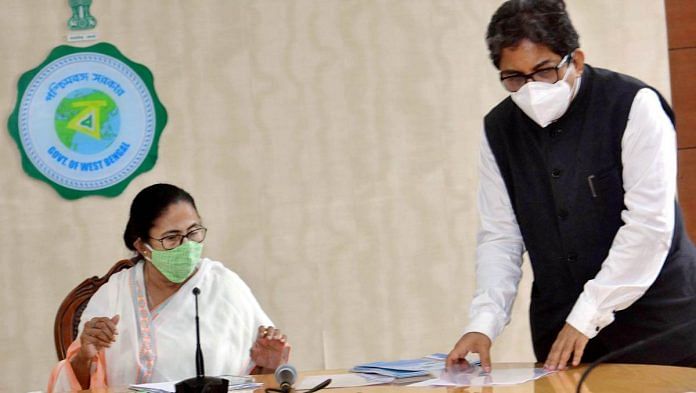As we witness another sordid saga unfold in West Bengal, thanks to the hubris of those who run the Narendra Modi government, one cannot help but wonder as to where the residents of the North Block are getting their legal advice from.
An incoherent and confused missive was sent to the West Bengal chief secretary Alapan Bandyopadhyay on the date he was to superannuate after 33 years of service, threatening him with a jail term for effectively having kept the Prime Minister waiting for 15 minutes. Not only does this reflect the arrogance of those who think that officers of the Indian Administrative Service (IAS) are the lapdogs of their political masters, but it reveals a complete and utter ignorance of the law, or perhaps, an inclination to treat it as petty inconvenience.
The independence of the civil services
The Supreme Court has repeatedly warned against the political dispensation’s interference in the IAS and the IPS. In T.S.R. Subramanian’s PIL in 2013, which was argued by the current Attorney General K.K. Venugopal, the Court had the occasion to frown upon the practise of oral directives to IAS officers:
“We are of the view that the civil servants cannot function on the basis of verbal or oral instructions, orders, suggestions, proposals, etc. and they must also be protected against wrongful and arbitrary pressure exerted by the administrative superiors, political executive, business and other vested interests.”
These views echoed the sentiments of the 2006 judgment in Prakash Singh Vs Union of India where another former civil servant had sought to insulate the IPS officers from the capricious transfers and appointments that have blighted independent administration. In fact, the robust nature of these principles were in full evidence last week when it was relied upon by the Chief Justice of India to ensure that the appointment of the new Central Bureau of Investigation chief was done only as per law and not as per the whims of the executive.
In the wake of a devastating World War unleashed by Fascist forces and after two centuries under a colonial yoke, there was one precept that formed the underpinning of our Constitution – that all Indians would form a single, equal class. There would be no opportunity for the citizen to be subjected to arbitrary State action, no matter how many seats in Parliament backed it. This protection was expressly extended by Part XIV of the Constitution to the civil servants who were to ensure the implementation of government policy and it was hoped that some modicum of decency would prevail among the political class not to undermine these provisions.
Sardar Patel, considered by many to be the architect of the All India Services, had the occasion to address the first batch of independent probationary officers on 21 April 1947 (a day now marked as Civil Services Day) and he said:
“A civil servant cannot afford to, and must not, take part in politics. Nor must he involve himself in communal wrangles. To depart from the path of rectitude in either of these respects is to debase public service and to lower its dignity.”
Yet, the events of last week demonstrate how far we have come from the Iron Man’s cherished hope, his sentiments cast into the shadow of a monument in his name.
Also read: Alapan Bandyopadhyay — Not just an IAS officer, but a trouble-shooter Mamata can’t do without
The legal question
The notice served upon the chief secretary Alapan Bandyopadhyay, who is now Chief Minister Mamata Banerjee’s principal advisor, attempts to indict him for “abstaining” from the review meeting “taken” by the Prime Minister. It also attempts to draw a tenuous link with the Disaster Management Act by needlessly pointing out that the PM happens to be the Chairman of the National Disaster Management Authority. According to Ashish Kumar Singh, the under secretary who has signed off the notice, this amounts to a violation of Section 51(b) of the National Disaster Management Act.
A mere glance at the Disaster Management Act would reveal that the Prime Minister has no individual power or function under it. Not a single one. He is admittedly a member and ex-officio chairperson of the NDMA, which includes nine others. Under Section 6 of the Act, this composite body has the overarching role of laying down disaster management policy and guidelines. No part of the functions of this authority includes the giving of directions, leave alone requiring individuals to attend meetings at the cost of incarceration.
Section 51(b) penalises non-compliance with any direction under the Act issued by a government or committee. The notice itself talks of no such direction that has been violated. In fact, in a blatant self-contradiction, it admits that the chief secretary did attend the review meeting (far from “abstaining”).
From 1952 onwards, the consistent position of the law in India has been that a power conferred by the law can only be exercised by the authority so designated. No minister, president or governor can purport to give directions under a law unless expressly cloaked with that authority.
Also read: Not IAS rules but Modi govt issues show cause notice to Bengal chief secy under disaster law
Irresistible force meets immovable object
In sum, it appears that the entire controversy emanates from an unfortunate clash of egos – a beleaguered Prime Minister perceives a slight from a Chief Minister who keeps him waiting. As even the most devoted of advisors would find it difficult to recommend President’s Rule on that count, it was decided to target the second-in-command. But was there even a moment of pause? Of quiet reflection? One can only hope that going forward, wiser counsel would prevail.
Gopal Sankaranarayanan is Senior Advocate, Supreme Court of India. Views are personal.



